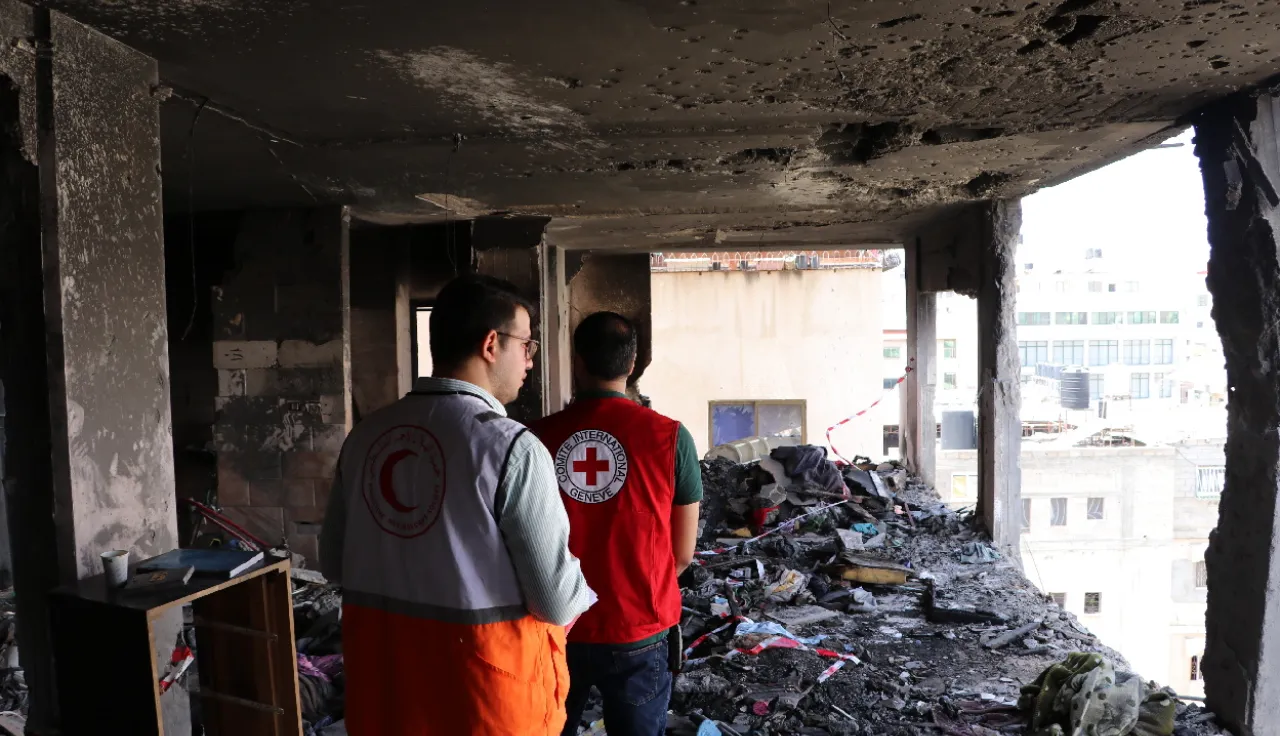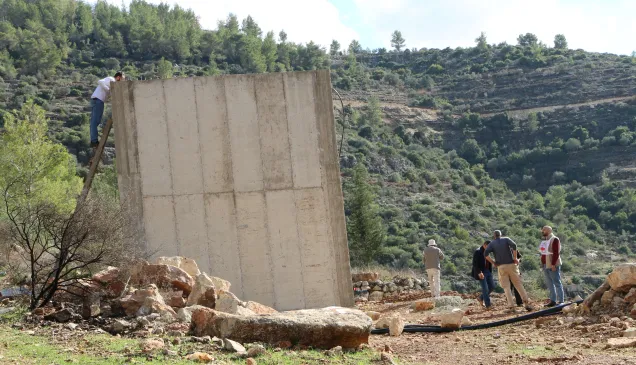Israel and the occupied territories: Facts and Figures January to June 2023

Through its permanent presence in Israel and the Occupied Territories (ILOT) since 1967, the International Committee of the Red Cross (ICRC) has been working to alleviate the suffering of people impacted by conflict.
Here is a snapshot of our activities in the first six months of 2023.
Through its permanent presence in Israel and the Occupied Territories (ILOT) since 1967, the International Committee of the Red Cross (ICRC) has been working to alleviate the suffering of people impacted by conflict.
Here is a snapshot of our activities in the first six months of 2023.
Ensuring Dignity in Detention
Within the framework of our endeavors to secure humane treatment and conditions of detention for detainees, we carried out 262 visits to Palestinian detainees in Israeli and Palestinian detention facilities, including 29 visits by medical staff to assess access to healthcare in Israeli detention and health facilities. We also contributed to the improvement of detention conditions for 11,539 detainees in the West Bank and Gaza Strip.
Maintaining Family Links
We facilitated permits for 29,165 family members and transported those who could conduct family visits to their relatives in Israeli detention facilities. 4,580 detainees were able to see their loved ones through regular visits. We also facilitated the exchange of 15 Red Cross Messages and 545 salamat (i.e., verbal greetings) between detainees and their families who are separated by local and international borders. We acted as a neutral intermediary between relevant authorities for various humanitarian crossings via Quneitra and Rosh-Hanikra checkpoints.
Supporting Vulnerable Communities
To address the humanitarian consequences of the occupation:
In Gaza:
- Financial support was provided to 20 fishing households, to rehabilitate their boats and restore their livelihoods.
- 49 households of persons with disabilities and individuals severely injured by confrontations were provided with grants to support starting a business.
- 50 honey producers received 150 climate-resilient beehives (three hives each) as part of an innovation project to tackle the effects of climate change.
- 28 olive farmers received 1,800 ecological traps to mitigate damage caused by the olive fruit fly in the border areas of Gaza and the Northern Governorates.
In the West Bank, including East Jerusalem:
- 118 households whose houses were demolished were provided with emergency cash support.
- 99 herders in areas affected by settlements expansions and settlers’ violence were supported with cash grants to help them rehabilitate animal shelters and improve animal breeding practices.
- 50,000 animals were vaccinated against chlamydia to reduce the mortality of fetuses in partnership with the Ministry of Agriculture (MoA) in the West Bank.
- 645 olive farmers received 6,400 ecological traps to tackle the effects of the olive fruit fly in Area C.
Access to Water and Electricity
- Access to essential services (i.e., water, electricity and waste water) was enhanced for more than 927,000 residents in the West Bank and Gaza Strip.
- Within the framework of the Gaza Resilience Program (which aims to help communities and systems absorb conflict-related shocks and recover more rapidly):
- The reliability and availability of electricity supply was improved through the installation of smart grid components and enhanced remote control capabilities.
- The capacity of water and wastewater facilities to continue to function during armed hostilities was increased, ensuring 749,400 residents in Gaza maintained access to essential water and sanitation services.
Healthcare for the sick and wounded
Caring for the Sick and Wounded
- One weapon-wounded kit was provided to the Ministry of Health (MoH) in Gaza during the May 2023 armed hostilities, with the capacity to treat up to 50 severely wounded people, along with 15 hospitals beds, 30 stretchers and several surgical sets.
- Three X-ray machines, five medical refrigerators, 21 sterilization machines and several physiotherapy items were provided to MoH primary health centers.
- 2,500 liters of fuel for a small generator was provided to the Palestinian Authority MoH Coordination and Liaison Office in Gaza, along with stationery and office material to ensure continuity of operations to process patients permit requests to the Israeli Civilian Liaison Authority (CLA).
- One Basic Ambulance Responder Training was conducted for 17 EMS staff from MMS, MoH and Civil Defense.
- Ten emergency department policies were developed by MoH, with ICRC support.
Physical Rehabilitation Program
- 1,642 persons with disabilities were supported with physical rehabilitation at the Artificial Limbs and Polio Centre (APLC) in Gaza.
- 55 children were supported at the clubfoot clinic of ALPC, using the Ponseti method.
- Assistive devices, wheelchairs, materials, orthopedic shoes, and tools were provided to ALPC, Palestinian Avenir of Childhood Foundation (PACF) and PRCS.
- 70 children with disabilities were provided with wheelchairs and other assistive devices at PACF.
- 100 players were supported with societal integration activities. This included 50 participants from the Football Amputee League and 50 children engaged in amputee football training.
Strengthening Mental Health and Psychosocial Support
- For the second year, 15 MMS staff were supported with scholarships to study a postgraduate diploma in Mental Health and Psychosocial Support (MHPSS) at Gaza Community Mental Health Program and Islamic University.
- 236 persons with disabilities benefitted from MHPSS support via the technical support and supervision provided to the ALPC.
- To enhance the psychological resilience of people with disabilities through theatre, ICRC partnered with the Bozour Association for Arts and Culture. The first and second phase of this intervention was completed, training 48 people with disabilities over 25 days.
- A memorandum of understanding was signed between the ICRC and the Israeli Trauma Coalition (ITC) to continue ICRC support to Mental Health and Psychosocial Support trainings ITC conduct in hospitals in the south of Israel.
Cooperation with National Societies
PRCS
- The PRCS ambulance service successfully responded to 55,941 calls, evacuated a total of 662 individuals that were effectively transported to hospitals and responded to field treatment of 4,269 cases during clashes.
- 120 Emergency Medical Service team members attended Basic Life Support and Advanced Cardiovascular Life Support trainings to advance their response skills and knowledge.
- 11 pallets of rehabilitation and medical supplies and 10 ambulances were delivered to PRCS Gaza branch, facilitated by the ICRC.
Magen David Adom (MDA) In Israel proper
- Initiatives such as the installation of defibrillators were part of MDA's and the ICRC’s efforts to address the needs of vulnerable communities.
- Training and capacity-building activities with MDA staff, including the National Disaster Response Team, were conducted to strengthen emergency response in cases of natural disasters in Israel.
Promotion of international humanitarian law and humanitarian principles
As the guardian and promoter of IHL, the ICRC takes action to protect and assist those affected by the Israeli-Palestinian conflict, and to foster respect for the law. It does the latter, notably by spreading knowledge of IHL to a wide range of local and international stakeholders, by supporting its implementation at the domestic level in Israel and the occupied territories, by monitoring respect for it by all parties and by reminding them of their obligations.
Community Engagement
The ICRC recognizes community members as valuable partners. To ensure that we meet the needs of those who are affected by conflict, who are at the heart of our work, we carried out a series of community-focused engagements in the first six months of 2023:
In Israel proper and occupied Golan:
- Visits were conducted with the MDA to communities affected by hostilities, aiming to monitor and support affected civilians.
- Meetings with Druze community leaders in the occupied Golan were held in order monitor developments there and hear their concerns.
In the West Bank, including East Jerusalem:
- 18 youth between 16-18 years old from Duhaisha refugee camp in Bethlehem were supported to participate in a series of activities and sessions on ICRC modalities of work and programs. PRCS participated in the activities and facilitated sessions on health care missions and their protection under law.
In Gaza:
- Over 10,000 residents received awareness sessions to better understand the risks of UXO and promote safer behavior in the Gaza Strip.
- One roundtable discussion with 30 detention stakeholders (including families of detainees).
- 61 people were reached via information sessions on a range of offered services and assistance and how to get in touch with the ICRC if needed.



